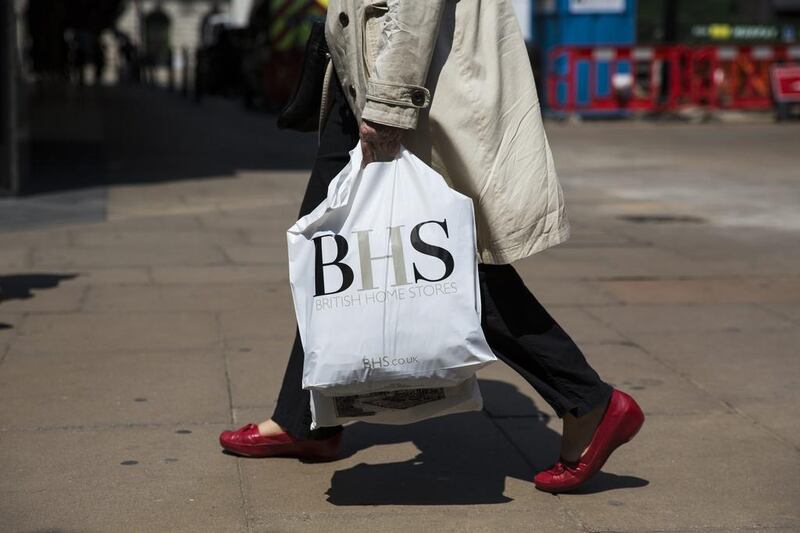Since I wrote about the collapse of the BHS stores group last week, the role of its former owner Sir Philip Green has eclipsed even the interminable Brexit arguments on the news pages of all the British newspapers.
Day after day new and even more lurid details have emerged in parliamentary hearings in what is still an unravelling saga. So far we have had allegations of diverted money, theft, lies, the SAS (a special forces unit of the British Army), US$150 million yachts, Bahamas accounts and even a death threat, not to mention a gross disregard for the pensioners and 11,000 staff who find themselves out of work. And there is more to follow over the next few days.
The peak of discomfort for Mr Green, once called “King of the High Street”, was the Daily Mail’s front page which featured a snatched photograph of the unshaven and dishevelled tycoon with the headline: “Strip Sir Shifty of his knighthood”. Other newspapers, including the weighty Financial Times, have been almost equally unkind about the retailer who has overnight emerged as Britain’s least-loved businessman.
On Wednesday, Mr Green, who sold BHS, is scheduled to appear before a parliamentary committee chaired by the veteran Labour MP Frank Field to provide his own version of one of the most bizarre corporate scandals for many years. Mr Field and his fellow MPs are keenly looking forward to the engagement, their appetite whetted further by Mr Green’s demand that Mr Field must resign after his statement on Friday that his committee “would laugh” if Mr Green were to offer less than £600m (Dh3.11 billion) to settle BHS’s pension debts.
“I am not prepared to participate in a process which has not even the pretence of fairness and objectivity and which has as its primary objective the destruction of my reputation,” trumpeted Mr Green. We shall see about that over the next 24 hours. Whatever evidence he provides to the committee, however, is unlikely to upstage the drama of the past week, which has been hilarious at times.
Darren Topp, BHS’s last chief executive, told the committee of his discovery that £1.5m had been transferred by Dominic Chappell, who bought BHS from Mr Green for the princely sum of £1 a year before it went bust, to BHS Sweden, an offshore company, which was not owned by the UK chain. “Before we call the police, let me ring Dominic,” Mr Topp recalled saying to an aide. When he did so, he said, his boss threatened to “come down and kill” him, a threat he took seriously because Mr Chappell claimed to be a former member of Britain’s special forces. Mr Topp also thought Mr Chappell, a former racing driver and three-times bankrupt, owned a gun. The BHS owner contests the account.
If Mr Green does turn up tomorrow – and it would be even more damaging for his already battered reputation if he refused – MPs will want to know why he had such confidence in the consortium led by Mr Chappell, who admitted to MPs that he had “not one stitch of retail experience”.
Mr Green’s purchase of BHS for £200m in 2002 transformed him from a minor league retailer into a billionaire tycoon. It was the springboard for the creation of his Arcadia empire with its flagship Top Shop chain, and allowed him to strut the stage with beautiful models on board one of his three yachts in the south of France.
Poor BHS, stripped of £400m in cash dividends, suffered a drought of investment, its sales fell by a quarter, resulting in persistent losses. Yet Mr Green has insisted that when he handed over the business to Mr Chappell it was “in a sound financial position with significant banking facilities in place”. The new owners, he asserted, “have a platform to grow the business and return it to profitability”. Within a year, the company ran out of cash and closed its doors.
Those not directly involved think the whole affair is a great hoot, relishing every new revelation in an increasingly bizarre affair. If the truth be known, they are also relishing in Mr Green’s discomfort and the embarrassment of his City advisers, notably Goldman Sachs, who everyone loves to hate. But apart from the plight of staff and pensioners, there is a more serious aspect to the saga.
The past week has been as much about 21st century capitalism in Britain as it has been about BHS. Mr Green, with his portly, cigar-chomping appearance, his yachts and his glamorous lifestyle, is the epitome of the fat cat capitalist the cartoonists love to depict, exploiting the poor workers, many of whom are on the minimum wage or below.
He was not alone last week in presenting modern capitalism in a poor light. Mike Ashley, founder and controlling shareholder of the sportswear retailer Sports Direct, also appeared before MPs to answer charges of the Dickensian conditions he enforced at his multibillion retail chain. MPs cited evidence alleging that employees queued to be searched as they left, had their pay docked if they took too long in the restroom and that one woman had given birth there.
He didn’t deny the allegations, admitting mournfully that the business had got too big for him to manage. He compared his job to driving an oil tanker or running an airport terminal, causing one commentator to remark sourly: “It’s a good job he controls neither”.
The one thing one can say about the Green and Ashley affair is that they have distracted attention, however briefly, from the interminable Brexit debate. But the referendum is now only a week away, so even Mr Green’s evidence, whatever new revelations it brings, will be buried in the onslaught. What a pity.
Ivan Fallon is a former business editor of The Sunday Times





